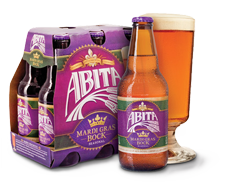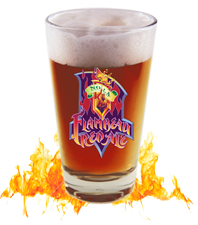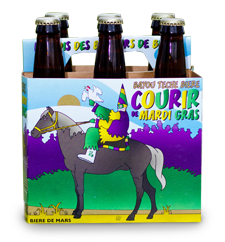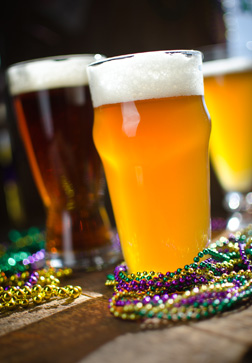It’s been noted that South Louisiana’s locals suffer through Thanksgiving, Christmas and New Year’s just to get to Mardi Gras season. Also known as Carnival, this is the month-long preparation for the fasts of Lent in heavily-Catholic South Louisiana. On the Monday before and on Fat Tuesday itself, all state offices, local businesses and parade route roads are closed. Even kids and students get a few days out of school to participate in the festivities!
Mardi Gras is taken very seriously—the celebrations are more important to the culturally proud Creole and Cajun population than any of our nation’s holidays.
The celebration commences on Epiphany (12 days after Christmas) and ends on the day before Ash Wednesday. “Mardi Gras” is French for Fat Tuesday, referring to the practice of celebrants’ last night of eating and imbibing way too much rich food, king cake and strong drink before the ritual fast of the Lenten season, which begins the next day.
Mardi Gras arrived in North America as a French Catholic tradition in 1699. The Le Moyne brothers, sent by King Louis XIV to preserve France’s claim on the territory of Louisiane, entered the mouth of the Mississippi River on the evening of March 2, 1699, or Lundi Gras.
The next day, the party proceeded upstream, where they slaughtered a native buffalo and celebrated Mardi Gras. In honor of the holiday, the brothers named the spot Point du Mardi Gras and called the nearby tributary Bayou Mardi Gras.
In New Orleans and the surrounding areas, the holiday has since been celebrated with opulent floats from krewes in lively and historic parades, flamboyantly-costumed performers throwing beads, doubloons and coconuts, accompanied by festive music from famous brass marching bands. The revelries last for over a month and not even this year’s mid-carnival Superbowl in the Big Easy put a dent in the celebrations.
There is a widely held impression of gigantic go-cups of inexpensive beer or even larger cups of potent, rum-fueled cocktails as the long-established liquid refreshment of choice for both locals and tourists. In reality a new tradition has been taking root since 1990—great seasonally-crafted beers to help lubricate the region’s pre-Lenten celebrations.
Abita Brewing Co. | Mardi Gras Bock
 Abita Brewing Co. has been brewing their Mardi Gras Bock since 1990. Abita’s President David Blossman says, “The Mardi Gras Bock is a great way to lead the parade of our seasonal brews every January. We wanted to brew something that was well suited to Carnival season and all the celebrations that go with it. Mardi Gras Bock’s rich, malt flavor and full body make it a great choice, and the higher alcohol content helps you feel a little warmer for the cool festive nights.”
Abita Brewing Co. has been brewing their Mardi Gras Bock since 1990. Abita’s President David Blossman says, “The Mardi Gras Bock is a great way to lead the parade of our seasonal brews every January. We wanted to brew something that was well suited to Carnival season and all the celebrations that go with it. Mardi Gras Bock’s rich, malt flavor and full body make it a great choice, and the higher alcohol content helps you feel a little warmer for the cool festive nights.”
This beer is similar to a German-style Maibock and is brewed with Pale, Pilsener and Caramel malts and German Perle hops. Abita celebrates the beer’s release every year with special release parties and pub crawls.
 NOLA Brewing | Flambeau Red Ale
NOLA Brewing | Flambeau Red Ale
New Orleans-based NOLA Brewing’s seasonal is Flambeau Red Ale, a super hoppy red ale made in honor of the Flambeau who have lit the way for parades in New Orleans since the earliest Mardi Gras celebrations. Lighting up the sky with blazing torches, the Flambeau serve as beacons for parade-goers to better enjoy the spectacle of nighttime festivities.
NOLA Brewing’s President Kirk Coco says that, “Flambeau Red always premiers the day of Krewe de Vieux, the first Mardi Gras parade of the season in New Orleans, which is also the only parade that winds its way through the French Quarter.” Flambeau Red is available on tap throughout South Louisiana and is 5.7 percent ABV and upwards of 60 IBUs. Kirk says that the beaucoup IBUs in their Mardi Gras beer give the season a “hop” to start on.
 Bayou Teche Brewing | Courir de Mardi Gras
Bayou Teche Brewing | Courir de Mardi Gras
In the more rural areas of Southwest Louisiana known as Acadiana by its French-speaking Cajun inhabitants, Mardi Gras is celebrated quite differently. With origins in rural and medieval France, Bayou Teche Brewing’s Louis Michot said that, “Several rural Cajun communities still celebrate the traditional Courir de Mardi Gras.”
Although there are variations, Michot explains that, “Each Courir has a Le Capitaine who leads masked and costumed revelers on horseback to beg and gather ingredients for the large communal gumbo that lies at the end of their journey.” A prized ingredient is a live chicken, which is often thrown into the air for the celebrants to chase through muddy fields.
Brewmaster Gar Hatcher said that, “Bayou Teche Brewing’s Courir de Mardi Gras is our artisanal version of the elegant French ale known as Biere de Mars. Courir de Mardi Gras is crafted with Pilsener, Munich and a large dose of Wheat malt.”
No two places in South Louisiana celebrate Mardi Gras the same. From decadent parades of ornately costumed performers to chicken-chasing trail rides through the countryside, each region has a unique way of marking the Tuesday that falls before Ash Wednesday. Despite the differences, everyone seems to agree that the celebrations are better when paired with a seasonally-brewed Mardi Gras beer from one of South Louisiana’s craft breweries.
CraftBeer.com is fully dedicated to small and independent U.S. breweries. We are published by the Brewers Association, the not-for-profit trade group dedicated to promoting and protecting America’s small and independent craft brewers. Stories and opinions shared on CraftBeer.com do not imply endorsement by or positions taken by the Brewers Association or its members.

Share Post